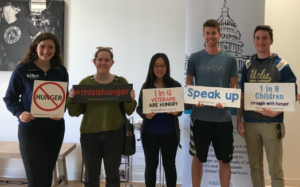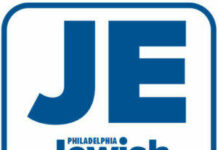
After 17 years under the name Challah for Hunger, the Philadelphia-based grassroots hunger-relief organization rebranded itself on Jan. 10 as Nazun, the Hebrew word for “we will nourish.”
The organization, created in 2004 at Scripps College to address food insecurity among students, began with members coming together to bake challah to raise money for local nonprofits fighting food insecurity.
As Challah for Hunger grew, it began to operate equally under the three pillars of community, philanthropy and advocacy, becoming not only an entity pushing to pass legislation to relieve food insecurity on college campuses, but also an incubator for young leaders interested in advocacy work beyond anti-hunger efforts. Nazun now has active chapters in 23 states.
However, most outsiders were not aware of the organization’s work.
“We found that a lot of the public perception of Challah for Hunger didn’t necessarily match all of that multifaceted work that we were doing,” Nazun Executive Director Rebecca Bar said.
Board member and naming working group chair Amy Zitelman experienced that firsthand, and an analysis conducted with 20 stakeholder interviews consisting of funders, donors, alumni and students reflected similar misconceptions.
“When I told people I joined the board of Challah for Hunger, most people thought it was a baking group,” she said.
Nazun leadership started to think about changing the name from Challah For Hunger before COVID, but when pandemic restrictions prevented them from baking challah, the need for a name change became even more apparent.
The organization was faced with a question: Who is Challah for Hunger without the challah?
“When the pandemic hit, and we couldn’t bake for close to two years, that question wound up really being answered for us, which was we still are relevant, viable, vibrant and very much active in all of the rest of the work that we do, beyond coming together and making and breaking bread with one another,” Bar said.
In partnership with branding agency Little Warriors, the organization chose a name that better reflected the breadth of its work.
The word “Nazun” created a sense of curiosity, argued Rabbi Lily Solochek, Nazun director of programs and education.
“It really opens up an opportunity for us to say, ‘This is what we do as an organization. This is the advocacy work we do; this is the community-building we do; this is the philanthropy we do,’” Solochek said.
Before becoming Nazun’s director of programs and education, Solochek was a staff adviser for a Challah for Hunger chapter at the University of Wisconsin, Madison — as well as someone who experienced food insecurity in college.
“College, in general, puts a huge demand on students, in terms of academics and extracurriculars and internships and all these things,” they said. “And adding one more layer for any student of not knowing where they’re going to get their next meal, if they’re going to get their next meal … It adds this extra layer of stress.”
When the pandemic struck, dining hall closures and students going home prematurely for the semester brought more awareness to food insecurity and, subsequently, to Nazun’s mission.
“The statistics that only very few people knew about became front and center in the headlines,” Bar said.
In addition to having a presence on college campuses, Nazun has partnered with nonprofit Swipe Out Hunger since 2019.
The organizations have similar missions and meet with legislators together to push for the passage of anti-hunger bills.
“In Pennsylvania and beyond, we provide an outlet for a lot of their students to engage in systemic policy change,” Swipe Out Hunger CEO and founder Rachel Sumekh said.
Swipe Out Hunger also receives 50% of the money raised by Nazun’s challah bake sales.
Nazun spearheaded a national campaign called FUEL Higher Ed, advocating for “fundamental, universal, equitable and long term” solutions to ending on-campus hunger.
Along with Swipe Out Hunger, Nazun is looking to help pass the Hunger Free Campus, which provides state-by-state funding for universities and colleges. The organization also advocated for the EATS Act, which reduces federal restrictions on the Supplemental Nutrition Assistance Program.
In 2021, Nazun launched a b’nai mitzvah pilot program for young Jews looking to host their own bakes to raise awareness of food insecurity.
In 2022, Bar hopes to expand Nazun’s presence to all 50 states as well as, when it’s safe, resume baking challah with community members.
Even after two years of challah being a small fraction of Nazun’s mission and now absent from its name, there’s clarity about the role challah played in Nazun’s inception and growth.
“Challah gave us a reason to come together,” said Carly Zimmerman, Challah for Hunger CEO from 2013-2019. “The challah baking was certainly a unique part of it, but it’s so much bigger than that.”
[email protected]; 215-832-0741






